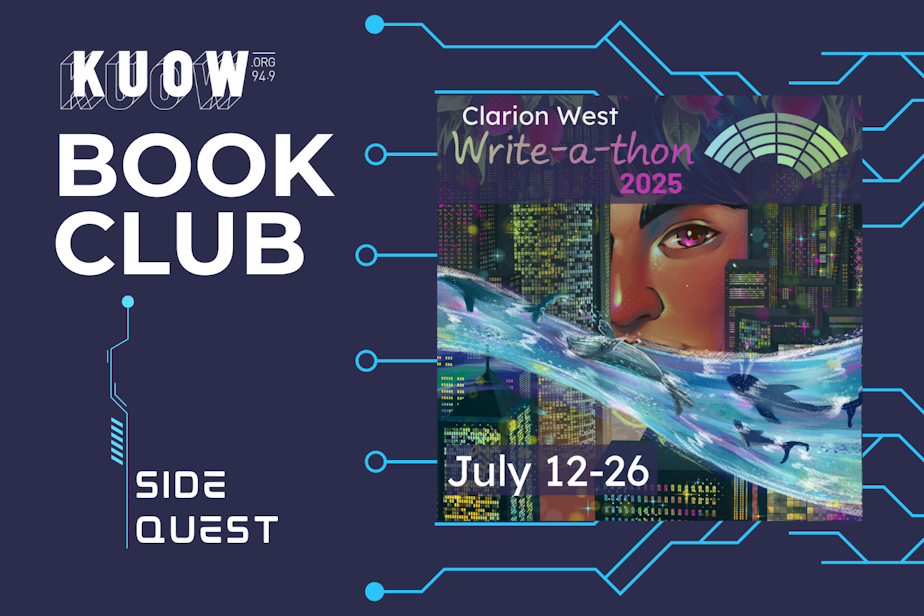Cordyceps, AI, and 'hope punk': Speculative fiction writers envision the future at Clarion West's annual write-a-thon

Speculative fiction and its common sci-fi themes often feel a little too real today. Writers seem to be not so much imagining the future but more so describing the present day — what it could be, what they hope it will be, what they fear it will be.
Consider how many classic ideas have become or are close to being reality: artificial intelligence, self-driving cars, violent weather events, advanced weapons. Things that were once the wild ideas of authors like Isaac Asimov, Margaret Atwood, and Octavia Butler seem to draw nearer to reality every year.
Coming up with a fresh take on these ideas can be tough. Heck, just putting pen to paper (or fingers to keyboard) is tough. Luckily for speculative fiction writers who need a little push, Seattle is home to Clarion West, a literary nonprofit that specializes in speculative fiction. And on July 12, it's launching the annual Clarion West Write-a-thon.
(For those who may be new to the genre, by the way, speculative fiction encompasses science fiction, fantasy, horror, magical realism, basically anything that involves an imagined reality. Yes, it's huge.)
Sponsored
Clarion West Executive Director Marnee Chua said there's this idea that "there's no new story out there," and sure, writers have to work at experimenting with different ways to tell similar stories.
Just a few years ago, Chua said Cordyceps were all the rage. Think of the parasitic zombies of "The Last of Us." Except in some cases, they were somehow both weird and hopeful.
"Like, maybe the mushrooms will clean up all of our air," Chua said.
RELATED: Check out KUOW's arts podcast 'Meet Me Here'
As interesting as it may be to write, and read, about the downfall of humanity, Chua said more writers are engaging in what they call "hope punk."
Sponsored
"Instead of a post-apocalyptic future, there might be a future for us," she said. "How do we get there? And what does it look like when we get there?"
As someone who gravitates toward dystopian fiction (maybe too much), that sub-genre has colored my view of speculative fiction more broadly.
I often think of Yevgeny Zamyatin's "We," a dystopian novel that was first published in 1924 and suppressed in Russia for more than 60 years. Though perhaps not as popular as the books it would later inspire — most notably, George Orwell's "1984" and "Animal Farm" — "We" was shockingly prescient for its time. And that's because "We" hinges on a common theme of the genre: an all-powerful "Benefactor" that lords over the people, allegedly for their own good.
It's not a comforting read, but there's something about reading it in the 2020s and thinking, "OK, so people across generations have these shared fears, these shared anxieties." If we can predict horror, maybe we can predict hope, too.
"It's all about community and support, and also this idea that there might be a future," Chua said. "What does post-capitalism look like?... Martha Wells, who writes ['The Murderbot Diaries'], which I'm famously a huge fan of, the main group that the Murderbot gets connected with is a whole planetary society that is very much post-capitalism. Even the 'Broken Earth' trilogy by N.K. Jemisin. It's just this whole other type of society and connections that I think takes us beyond what we're seeing now and how disparate we are and how hard it is to imagine us, especially in this country, like ever coming together."
Sponsored
Speculative fiction writers are imagining how that might all work.
RELATED: Subscribe to the KUOW Book Club newsletter here
From July 12 to 26, writers can help imagine that future during the Clarion West Writer-a-thon. Participants set writing goals, which are supported through donations raised by the writers. Think of it like a walk-a-thon; people pledge to give to Clarion West as writers meet their goals. The money raised during the write-a-thon goes toward classes, workshops, panels, and other programs for emerging writers.
And while Clarion West is here in Seattle, you don't need to be to participate. The write-a-thon is open to writers anywhere in the world.
"What's been most exciting, I think, in the last 10, 20 years, is the diversity of writers coming out," Chua said. "The more fresh, new stories and takes, the better. You just learn so much more, and you see a whole different side of what we could be imagining."
Sponsored
(Book Bingo bonus: If you need to fill that "author from another continent" square on you bingo card and want a speculative fiction recommendation, check out Argentine author Agustina Bazterrica's intense novel "Tender is the Flesh." Bazterrica envisions a terrible future in which all animal meat has been contaminated by a virus, so cannibalism is legalized. Sorry, this one is not hope punk!)
RELATED: On your mark, get set, read! Seattle Public Library's Book Bingo is back and bigger than ever




